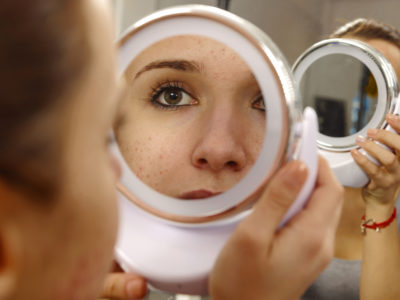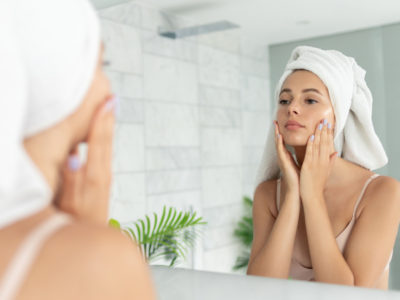Table of Contents[Hide][Show]
Does summer make you think of glowing, bronzed skin?
It’s a tantalizing promise, but the reality can be much different: dull, dehydrated skin that’s lost its luster.
Summer is incredibly challenging, and potentially damaging, for your skin. Your regular skincare products probably aren’t formulated to withstand the season’s heat, humidity, and intense UV rays.
But with the right summer skincare routine, you can restore your glow and leave your skin looking, and feeling, absolutely sun-sational!
So take off your sunglasses, and let’s take a closer look at the skincare practices and products that will help you maintain healthy, hydrated skin all season long.
Stay Hydrated
Hydrated skin is happy, healthy skin!
Water is essential to your health all year round. But in the summer, you lose more water to sweat, making it especially critical to stay hydrated.
Water helps your skin retain its elasticity—its ability to bounce back to its original state—and suppleness. When your skin is well-hydrated, it appears more plump and youthful. If your skin is dehydrated, you may see signs such as fine lines, wrinkles, and sagging.
Drinking enough water also helps you flush out toxins. These toxins can cause skin issues such as breakouts or acne.
If your skin looks dull, dry, or flaky or if it’s showing increased signs of aging, dehydration may be the culprit. It may be time to increase your water intake.
So how much water should you drink?
You may have heard the 8×8 rule: eight 8-ounce glasses of water. That’s a good goal, and achievable for most people. But in the summer, especially if you’re spending extra time in the heat, you may need to increase that number.
For extra hydration, you can also add hydrating foods, such as cucumbers, watermelon, strawberries, and leafy greens to your diet.
Related
What Is Mineral Water, and Is It Good For You?
What is mineral water and how does it differ from spring water and tap water? Find out what’s behind this trend and if mineral water is good for you.
Apply (And Re-Apply) Sunscreen
Just like drinking enough water, using sunscreen should be an all-year practice.
But it’s especially important during the summer months, when UV rays are stronger and can cause more damage. Even on cloudy days, the sun’s rays can penetrate clouds.
Here are some safe-sun tips to follow this summer for healthy, glowing skin.
- Before you leave home, apply a generous layer of sunscreen to any part of your body that may be exposed to the sun: your face, neck, arms, legs, and even your hands and feet. Use an SPF chapstick to keep your lips safe, too.
- For the best protection, experts suggest choosing a sunscreen with an SPF (sun protection factor) of 30 or higher.
- Choose a broad-spectrum sunscreen, which will protect your skin from both UVA and UVB rays.
- If you’re going to be swimming or sweating, use water-resistant sunscreen. While it won’t last all day, it’ll stay on better and give added protection.
- When possible, choose a sunscreen with only clean, organic ingredients. There’s evidence that certain ingredients Oxybenzone, Octinoxate (or octyl methoxycinnamate), Homosalate, and others have toxic effects such as allergic reactions and hormone disruption.
Regardless of the SPF, you should always reapply sunscreen every two hours at minimum, and reapply after swimming or sweating excessively.
Avoid Peak Sun
Even if you’re diligent in your sunscreen usage, it’s best for your skin to limit your sun exposure.
Try to stay out of the sun between the hours of 10 a.m. and 4 p.m., when the sun’s rays are most intense. Going to the beach? Bring shade, such as a canopy or umbrella, or find a spot under a tree, for a sun break when you’re out of the water.
If you must be out in the sun during those hours, wear protective clothing such as wide-brimmed hats and long-sleeve, lightweight “rash guard” shirts with an SPF rating.
But do keep in mind that vitamin D, “the sunshine vitamin,” is essential to your well-being. It plays a crucial role in helping you build and maintain strong bones, strengthening your immune system, and supporting muscle movement, among other functions.
Unfortunately, most people don’t get enough vitamin D from their diet. Instead, your body produces it when you spend time in the sun. Less sun equals less vitamin D.
So what can you do to get enough of this vital nutrient in the summer?
This vitamin D supplement from Just Thrive offers the vitamin D dose your body needs.
With its naturally derived vitamin D3—the same D vitamin your body produces when exposed to sunlight—this supplement can support your immune health, promote strong, healthy bones, muscles, and teeth, and contribute to increased energy and vitality.
And, as an added bonus, it also contains a potent, proprietary vitamin K2, which further supports your brain, bone, nerve, and cardiovascular health.
Go Fresh and Light
Summer is the perfect time to lighten up your skincare routine!
Swap heavy products, such as thick moisturizers, serums, and cosmetics, for lightweight, non-comedogenic skincare products for summer that won’t block your pores and cause blemishes.
Or consider skipping makeup altogether, leaving the house with a fresh face—aside from sunscreen, of course.
It’s also a great time to focus on “clean” skincare products, those generally formulated with safe, non-toxic, and natural or organic ingredients.
During the summer, when skin is more prone to sweat and exposure to environmental pollutants, using clean products helps prevent clogged pores and breakouts.
And, clean products often contain natural antioxidants and hydrating ingredients that protect your skin from UV damage and keep it moisturized.
Choose Ingredients Carefully
Spending extra hours in the bright sun? Be mindful of your summer skincare ingredients!
Believe it or not, some of the most common “safe” skincare ingredients can make your skin more prone to sunburns and other sun damage.
Here are some ingredients you should avoid to keep your skin healthy in the summer sun.
- Retinol is highly valued for its collagen-boosting and exfoliating properties, which can give skin a more youthful appearance. Unfortunately, those freshly exposed skin cells are extremely vulnerable to sun damage.
- Hydroquinone can reduce the appearance of dark spots and even out your skin tone. It also heightens your skin’s sensitivity to sunlight, increasing the chances of sunburn.
- Exfoliating acids, such as glycolic, lactic, and salicylic acid, can work wonders on acne-prone skin. But they work by removing your skin’s surface cells, including the protective layer, which leaves your skin more sensitive to harmful UV rays.
Even essential oils, prized for their naturally healthy properties, can be harmful when exposed to sunlight. Citrus oils such as lemon, blood orange, grapefruit, and bergamot can cause chemical burns and should be avoided when you’re going to spend time in the sun.
If you absolutely must use products containing these ingredients, switch to nighttime or indoor use only. Make sure you wash them off your skin before going into the sun, and, as always, apply sunscreen before you go out.
Include Antioxidants
When UV rays enter your skin, they can generate unstable molecules known as free radicals.
To stabilize themselves, free radicals “steal” electrons from nearby cells, causing damage known as oxidative stress. Signs of oxidative stress on your skin might include fine lines, dark spots, and a dull, uneven skin tone.
Antioxidants stabilize free radicals, halting, and possibly even reversing, the damage they cause to your skin.
During the summer, with prolonged exposure to stronger UV rays, it’s especially important to arm your skin with protective antioxidants.
Look for skincare products, including moisturizers, serums, and cosmetics, that contain antioxidants such as vitamin C (ascorbic acid), vitamin E (tocopherol), green tree extract, and resveratrol.
Another way to protect your skin from oxidative stress is to add antioxidant-rich foods to your diet. Berries, whole grains, nuts and seeds, citrus fruits, and green tea can help protect your skin from damage.
There are also certain probiotics that can increase your antioxidant production. Our favorite Just Thrive Probiotic.
It contains 4 potent probiotic spore strains specially chosen for their ability to arrive 100% alive in your gut microbiome, where they can get right to work supporting your overall health.
One of these proprietary superstrains is Bacillus indicus HU36™, which has been proven to create 15 potent antioxidants right in your gut, where your body can best absorb and utilize them.
This powerful probiotic even helps improve your sleep quality, another essential element to hydrated, healthy skin. In fact, studies show that getting 7–9 hours of sleep per night can even help your skin be more protected from UV damage!
Keep Using Moisturizer
It may seem counterintuitive, but a good moisturizer is just as necessary in the hot, humid summer months.
There’s a big difference between dry skin and dehydrated skin.
- Dry skin is a skin type, characterized by a lower amount of oil.
- Dehydrated skin, on the other hand, is a skin condition caused by a lack of water.
Sweating, taking extra showers, and excessive face-washing, all common in the summer months, can strip your skin of the water it needs to look its best. And as a result, even oily skin can get dehydrated—it’s lacking in water, not oil.
So even if your skin feels, or looks, slick in the summer, it’s essential to keep your skin quenched. Use a gentle cleanser followed by a lightweight, easily absorbed moisturizer to keep your skin glowing all summer long!
Soothe After the Sun
Despite your best intentions, there will be days when summer will take its toll on your skin. Whether it’s a sunny day at the beach or an unexpectedly long outdoor outing, your skin may not look, or feel, its absolute best.
Here are some things you can do if your skin is feeling the effects of summer.
- Wash off sweat or sunscreen as soon as you can. Both of these can clog pores and cause skin blemishes and breakouts. Resist the temptation to use a harsh cleanser or scrub; use milder products that protect your skin’s natural moisture.
- Take a cool, not hot, shower post-sun. Cold water closes your pores, helping your skin retain the natural oils and moisture that keep it hydrated.
- Moisturize your face and body to replace lost water and rehydrate your skin. Special “after-sun” creams and lotions are especially hydrating and soothing.
Final Thoughts
The summer months don’t have to be harsh on your skin.
As long as you take the proper precautions and follow these summer skincare tips, you can enjoy healthy, hydrated skin, regardless of how hot or bright it is outside!
But remember: sunscreen is a must, always.
You May Also Like…





